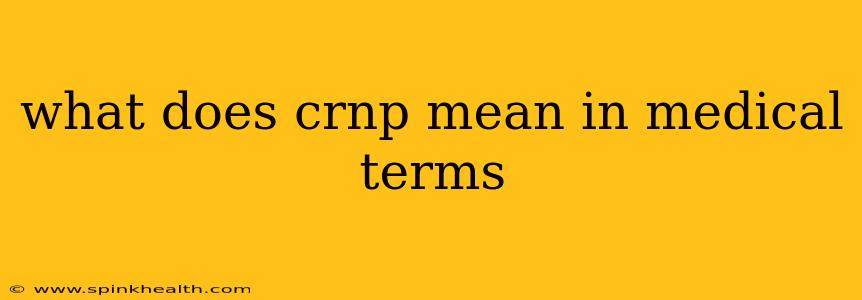What Does CRNP Mean in Medical Terms? A Journey into the World of Nurse Practitioners
The letters CRNP might seem like a cryptic code, but in the medical world, they represent a highly skilled and respected healthcare professional: a Certified Registered Nurse Practitioner. Let's unravel the meaning and explore what makes a CRNP a vital part of modern healthcare.
My journey into understanding CRNPs began with a simple Google search, much like yours. I was struck by the sheer breadth of their responsibilities and the significant impact they have on patient care. It's more than just a title; it’s a testament to years of rigorous education, clinical experience, and unwavering dedication.
What exactly does a CRNP do?
CRNPs are advanced practice registered nurses (APRNs) who possess extensive knowledge and skills in diagnosing and treating illnesses, managing chronic conditions, and ordering and interpreting diagnostic tests. Think of them as the bridge between a registered nurse and a physician. They provide comprehensive, holistic care, focusing on preventative measures and patient education. They're not just treating symptoms; they're striving to understand the root causes of a patient's health issues.
My research led me down a fascinating path, uncovering the intricate details of their training and the scope of their practice. This is far from a simple job description; it’s a profession that demands both intellectual prowess and an unwavering commitment to patient well-being.
What is the difference between a CRNP and an RN?
This is a crucial distinction, and one that many people struggle with. While both are nurses, their roles and responsibilities differ significantly. An RN (Registered Nurse) provides direct patient care under the supervision of a physician or other licensed healthcare professional. They are vital members of the healthcare team, focused on implementing the care plan developed by a physician or other provider.
A CRNP, on the other hand, has completed advanced education and holds a master's or doctoral degree in nursing. This advanced training allows them to perform a much wider array of duties, including diagnosing and treating patients independently. They function more autonomously than an RN, collaborating with other healthcare professionals to ensure the best possible patient outcomes.
How long does it take to become a CRNP?
The path to becoming a CRNP is a challenging but rewarding one. It typically involves years of dedication and hard work, encompassing undergraduate nursing education, followed by a graduate degree in nursing with a specialization in a particular area. The specific time commitment varies depending on the individual's educational background and the chosen program, but it typically takes several years beyond a basic RN qualification. The intense training ensures these professionals are equipped to handle the complexities of advanced practice.
What kind of conditions do CRNPs treat?
The beauty of the CRNP profession lies in its versatility. Depending on their specialization, CRNPs can treat a wide range of conditions, from routine checkups and vaccinations to managing chronic conditions like diabetes, hypertension, and heart disease. Some CRNPs specialize in areas like pediatrics, geriatrics, family medicine, or even specific medical areas like oncology or cardiology. The diversity of their specialization makes them incredibly valuable assets within any healthcare system.
Are CRNPs licensed?
Yes, CRNPs are licensed healthcare professionals. Licensing requirements vary by state, but all states require CRNPs to pass rigorous examinations and meet specific educational and experience standards before they can practice. This licensing ensures patients receive care from qualified and competent practitioners.
In conclusion, the abbreviation CRNP represents a significant level of expertise and dedication within the nursing profession. Their advanced training, autonomy, and comprehensive approach to patient care make them an invaluable component of modern healthcare systems. It's more than just a medical acronym; it’s a symbol of advanced nursing practice and a commitment to providing high-quality patient care.

